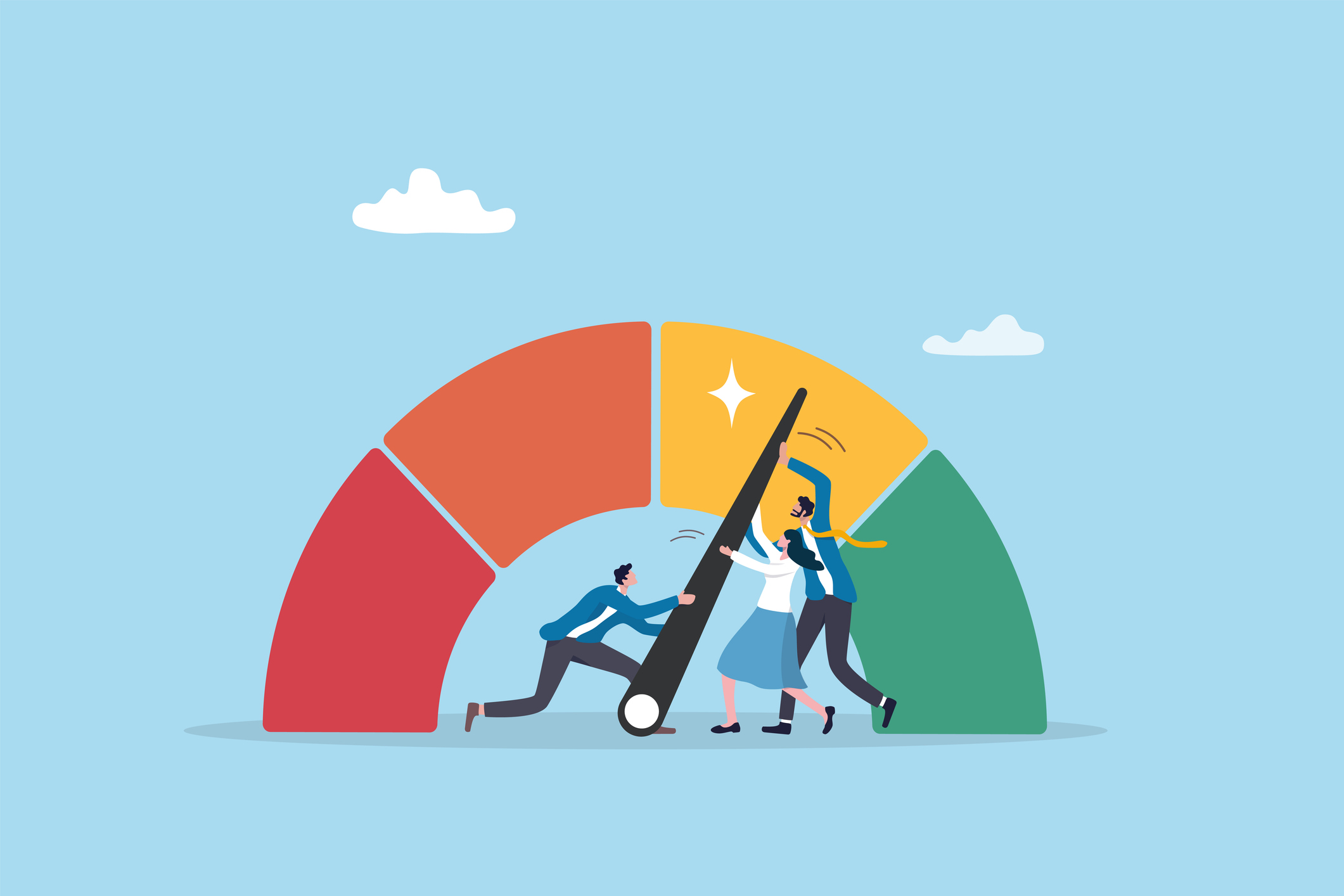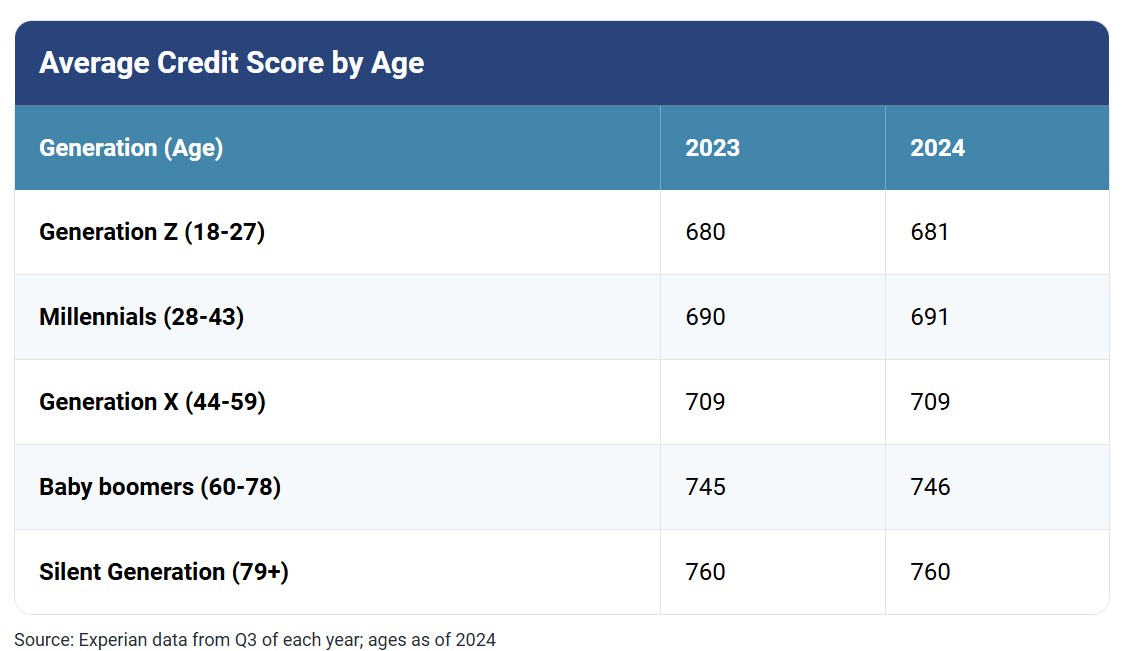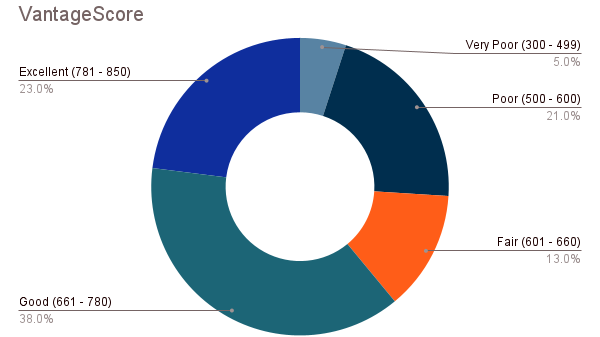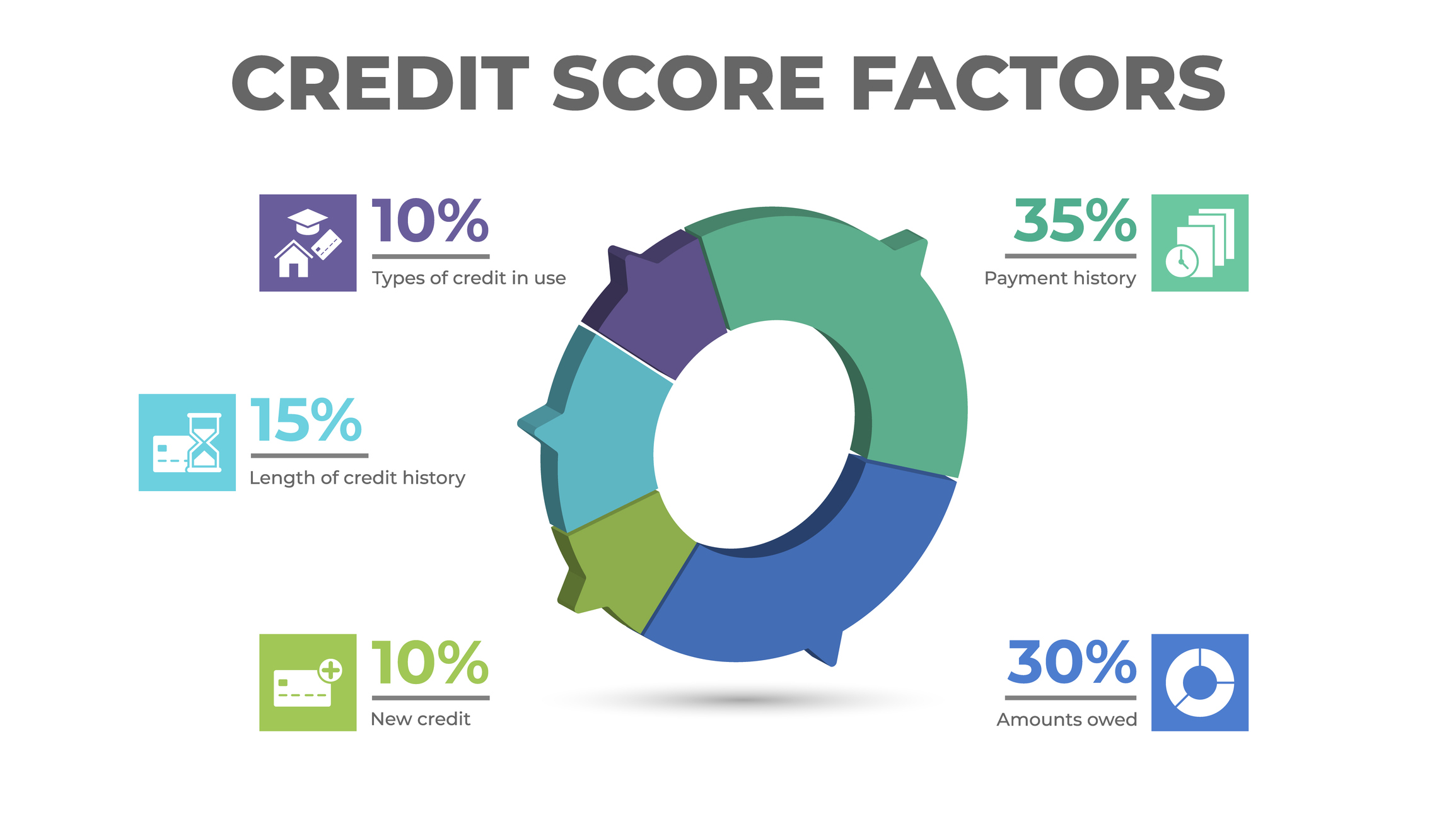What Is a Good Credit Score?
Having a good credit score can save you hundreds, even thousands of dollars on credit cards, mortgages and other loans.

Profit and prosper with the best of Kiplinger's advice on investing, taxes, retirement, personal finance and much more. Delivered daily. Enter your email in the box and click Sign Me Up.
You are now subscribed
Your newsletter sign-up was successful
Want to add more newsletters?

Delivered daily
Kiplinger Today
Profit and prosper with the best of Kiplinger's advice on investing, taxes, retirement, personal finance and much more delivered daily. Smart money moves start here.

Sent five days a week
Kiplinger A Step Ahead
Get practical help to make better financial decisions in your everyday life, from spending to savings on top deals.

Delivered daily
Kiplinger Closing Bell
Get today's biggest financial and investing headlines delivered to your inbox every day the U.S. stock market is open.

Sent twice a week
Kiplinger Adviser Intel
Financial pros across the country share best practices and fresh tactics to preserve and grow your wealth.

Delivered weekly
Kiplinger Tax Tips
Trim your federal and state tax bills with practical tax-planning and tax-cutting strategies.

Sent twice a week
Kiplinger Retirement Tips
Your twice-a-week guide to planning and enjoying a financially secure and richly rewarding retirement

Sent bimonthly.
Kiplinger Adviser Angle
Insights for advisers, wealth managers and other financial professionals.

Sent twice a week
Kiplinger Investing Weekly
Your twice-a-week roundup of promising stocks, funds, companies and industries you should consider, ones you should avoid, and why.

Sent weekly for six weeks
Kiplinger Invest for Retirement
Your step-by-step six-part series on how to invest for retirement, from devising a successful strategy to exactly which investments to choose.
A credit score is a number, usually from 300 to 850, that provides a snapshot of a consumer’s creditworthiness. Lenders use these scores to decide whether a potential borrower is qualified for a loan and, in many cases, to set the interest rate and other terms.
By tracking and keeping a score in the good range or better, consumers might qualify for one of the best rewards credit cards or for other types of loans.
One of the best ways to track your credit score is by using a monitoring service such as myFico. It'll alert you if there are any changes to your credit report so you can address them promptly.
From just $107.88 $24.99 for Kiplinger Personal Finance
Become a smarter, better informed investor. Subscribe from just $107.88 $24.99, plus get up to 4 Special Issues

Sign up for Kiplinger’s Free Newsletters
Profit and prosper with the best of expert advice on investing, taxes, retirement, personal finance and more - straight to your e-mail.
Profit and prosper with the best of expert advice - straight to your e-mail.
What is a good credit score?

Two companies control the market for credit scores: FICO and VantageScore. FICO considers a score of 670 to 739 as good, while VantageScore rates a score of 661 to 780 as good.
FICO boasts that 90% of top lenders rely on their scores, and consumers generally need to focus on their FICO score first. Credit card companies, however, often consider both FICO and VantageScores.
How do you measure up to other borrowers?
The average FICO score in the U.S. was 705 as of January 2026. Want to see how you measure up? Here's a table of average credit scores by age:

The latest versions of the VantageScore also use a 300 to 850 scale, with about 61% of Americans having a Good VantageScore or better.

How to check your credit score?
There are three ways to see your FICO credit score for free.
- Many banks and credit card issuers offer customers free FICO scores every month, so look at your account online or your credit card statement.
- Equifax, one of the three credit bureaus, offers free scores at myFICO.com/free.
- Experian also provides a free score and credit report at www.freecreditscore.com.
- To check your VantageScore, sign up for Chase Bank’s free credit-monitoring service, Credit Journey, or see other programs offered by VantageScore partners.
Checking your credit score using FICO or Vantage, called a “soft pull,” won't harm your credit score. But when you apply for a credit card or loan, the lender will conduct a “hard pull,” running a report that will temporarily lower your credit score.
That is why knowing your credit score is so important before applying for a loan or card. If you've applied for a few credit cards and been rejected, your credit score will be lower, and it will be even harder to qualify for a new card until some time has passed, and your credit score has recovered.
Why do I have more than one credit score?
There are myriad factors that determine your credit score. FICO and VantageScore base their algorithms on the same underlying data but assign a different weight to the same criteria.
FICO and VantageScore get these data, in turn, from three credit bureaus that track your credit activity: Equifax, Experian and TransUnion. As a result, you might see slightly different scores based on whether data was pulled from all three bureaus or just one.
Credit bureau and scoring algorithms also have different versions; sometimes a lender will use a score drawn from the latest version or rely on an older, even years-old version of the algorithm.
What affects my credit score?

Across all the credit reporting and scoring services, these are the most important factors that go into your credit score.
Payment history is based on your record of paying bills on time and is the most important criterion for determining your score. Late or missed payments can significantly lower your credit score, which is why it's important to add credit card payments to your budget. Use a budgeting app such as Quicken's Simplifi, which can project future cash flow to ensure you have money on hand for payments.
Credit utilization reflects the amount of credit you're using relative to your credit limit. Using more than about 30% of your available credit will likely lower your score.
Length of credit history refers to the amount of time you've had your accounts. A long credit history demonstrates that you've had plenty of practice managing debt payments.
Credit mix refers to the types of credit you rely on. Having both installment (mortgages and car loans) and revolving (credit cards) loans will increase your score since it shows you can handle different types of payments and terms. If you're thinking of taking on a Buy Now Pay Later loan, see below for details on how they might affect your score.
New credit accounts or applications can lower your credit score by generating a “hard pull” and by lowering your average length of credit history.
Retiring might reduce your income and use of credit cards and loans that bolster your score. Be sure you understand how retirement could hurt your credit score (but can be avoided).
Tips for increasing/protecting your credit score
Here are tried-and-true strategies to boost your credit score.
Pay your bills on time and if you can, pay the total amount due each month.
Keep your credit utilization low, ideally below 30% of your credit limit. Paying off your statement balance is ideal because it allows you to maximize credit card rewards without incurring interest.
Don’t close old credit card accounts. If you're thinking of closing a credit card that you’ve had for many years to avoid an annual fee, consider asking the card issuer to roll the account onto a similar card with no fee. You'll maintain your long credit history even if you never use the card.
Check your credit report and credit score periodically. You can now get free credit reports for free from all three credit bureaus at annualcreditreport.com, every week. Look for incorrect information or fraudulent activity, and know how to fix your credit report if you find errors.
Not sure what a credit report is? Check out our article showing the difference between credit scores and credit reports.
Once you get a good or even excellent credit score, don’t rest on your laurels. Good credit hygiene, such as keeping up with all of your credit card or loan payments, can help you qualify for choice loans in the future.
What credit score do I need to buy a house?

Conventional loans. When you buy a home, you will most likely take out a conventional loan. The minimum credit score you'll need is 620 to 660, depending on the lender. A higher score usually means you will get a better deal on your mortgage interest rate.
Jumbo loans are generally defined as loans over $832,750. You will typically need at least a 700 credit score, though the average score is 740, according to Bankrate.
Other types of loans. Lenders typically require a credit score of 620 for VA loans, 500 for FHA loans and 580 for USDA loans.
What credit score do I need to buy a car?
If you're shopping for a car, you should ensure your credit score is 661 or higher. According to the Experian State of the Automotive Finance Market report (PDF), as of the fourth quarter of 2024, more than 68% of borrowers met or exceeded that threshold.
Less than one-fifth of borrowers had scores of 600 or less.
Credit score myths
No, not everyone 18 or older in the U.S. has a credit score, even though 42% of Americans think it is true. That's one of the many misconceptions consumers have about how to monitor and build good credit. According to a study by Capital One Insights Center, there are a host of myths surrounding credit scores; here are some of the biggest doozies.
My spouse's credit will affect my credit score - False. If your spouse has a low credit score and you apply for a joint loan, that low score might impact your ability to get a loan with good terms, but the score itself will not drag down your own score.
A hard credit check (or credit "pull") will not affect my score - False. There are two kinds of credit card inquiries: hard and soft. Hard inquiries will lower your score temporarily, and too many hard pulls in quick succession could really damage your score. Lenders perform a hard pull when you apply for new credit, like a credit card, a car loan or a mortgage. Hard inquiries stay on your credit report for two years, so it's important to think strategically when you want to trigger one. Soft credit checks that will not affect your score include instances when your bank updates your free FICO score, or your employer checks your credit after you're offered a job.
Carrying a balance (not paying the total amount due) on your credit card each month is a good way to increase your credit score - False. Most older consumers knew this statement was false on the Capital One survey, but almost half of millennials polled, and 53% of Gen-Z respondents, thought this statement was true. By not paying your balance in full each month, you risk paying high interest rates and increasing your credit utilization rate, which can lower your credit score.
Buy Now Pay Later (BNPL) and your credit score

Some consumers are turning to Buy Now Pay Later (BNPL) to make large purchases over time, usually in four payments with no interest due. These loans, sometimes called "point-of-sale installment loans" or "pay-in-4" have grown rapidly.
There is no cookie-cutter version of BNPL. The lending agency might be your own credit company, a bank or an app-based service such as Affirm or Afterpay. This lender diversity means that terms might vary, so it's crucial to do your research before signing up for BNPL.
Anyone considering a BNPL should be wary. Hidden fees and weak regulation have led BNPL plans to come under scrutiny and criticism from a host of government agencies and consumer watchdog organizations such as Consumer Reports.
Ways BNPL services can improve your credit score.
- For consumers who have poor or even no credit history, a small BNPL loan might help make ends meet for an important purchase. Since most BNPL services don't conduct a hard credit pull, consumers can get access to credit without lowering their credit score.
- Some BNPL lenders provide services to help you improve your credit score. For example, customers of Sezzle can elect to have their payments reported to all three credit bureaus in a program called Sezzle Up. If you can make on-time payments, your credit score might improve. However, if you miss a payment or are late, that will also be reported, so only use this service if you have enough cash flow to pay fully and on time.
How BNPL services may harm your credit score
- If you don't understand the terms of a BNPL loan, you might pay expensive fees that could unnecessarily stress your financial health. For example, some BNPL lenders charge an installment fee, essentially acting as interest on the loan. Late fees might also make paying back your loan more difficult.
- A high number of BNPL customers rack up overdraft fees from their banks. A recent survey from the Consumer Federation of America and the Center for Responsible Lending found that 37% of these borrowers were charged an overdraft fee in the last six months.
- If you fail to make a payment, some BNPL lenders (such as Zip, might turn over your account to a collections agency, harming your credit score.
- If you return an item or an item is damaged, the BNPL lender might not be able to credit your account quickly. In that case, you might still have to make payments to avoid late fees. If you've already paid the full BNPL loan but the item is unusable, you might not get a refund. If you can't make those payments, your credit score could be harmed.
- If you elect to pay BNPL installments with a credit card, you might be charged interest by that card if you're unable to make your monthly payment. Late or incomplete credit card payments will damage your credit score.
On-time rent payments can boost your score
Your landlord doesn't typically report on-time rent payments to the three credit bureaus that generate your credit reports. This is a disadvantage for renters; they can't demonstrate responsible financial practices with one of their biggest monthly expenditures — rent.
You might think that charging rent payments to a rewards credit card would help solve this problem and maybe earn you some cash back or miles.
But credit cards charge a fee to pay your rent that might cancel out or even exceed the rewards you earn. There is one exception to this: The BILT credit card allows you to pay rent on the card without those fees, and you earn travel rewards. BILT reports your on-time payments to credit bureaus, helping you increase your credit score.
The real estate technology firm Zillow launched a similar program. Tenants renting through Zillow can ask the company to report their rental payments to credit bureaus. Zillow won't report late payments.
Hiow a good credit score affects your personal finances
Your credit score touches many areas of your financial life: From the interest rates you'll pay on loans to insurance premiums, your credit score can determine whether you pay more or less for the things you need.
Knowing the factors that influence credit scores can help adjust behaviors to ensure you're earning the highest score possible. That way, you don't pay more than you have to on loans, insurance and credit cards.
Related Content
- Credit Score vs. Credit Report: What's the Difference?
- Credit Reports Are Now Permanently Free Weekly
- What Does Your Credit Score Really Mean?
- How Does Marriage Affect Your Credit Score?
- 6 Ways to Boost Your Credit Score
Profit and prosper with the best of Kiplinger's advice on investing, taxes, retirement, personal finance and much more. Delivered daily. Enter your email in the box and click Sign Me Up.

Ellen writes and edits retirement stories. She joined Kiplinger in 2021 as an investment and personal finance writer, focusing on retirement, credit cards and related topics. She worked in the mutual fund industry for 15 years as a manager and sustainability analyst at Calvert Investments. She earned a master’s from U.C. Berkeley in international relations and Latin America and a B.A. from Haverford College.
-
 5 Vince Lombardi Quotes Retirees Should Live By
5 Vince Lombardi Quotes Retirees Should Live ByThe iconic football coach's philosophy can help retirees win at the game of life.
-
 The $200,000 Olympic 'Pension' is a Retirement Game-Changer for Team USA
The $200,000 Olympic 'Pension' is a Retirement Game-Changer for Team USAThe donation by financier Ross Stevens is meant to be a "retirement program" for Team USA Olympic and Paralympic athletes.
-
 10 Cheapest Places to Live in Colorado
10 Cheapest Places to Live in ColoradoProperty Tax Looking for a cozy cabin near the slopes? These Colorado counties combine reasonable house prices with the state's lowest property tax bills.
-
 My First $1 Million: Retired Nuclear Power Plant Supervisor, 68, Wisconsin
My First $1 Million: Retired Nuclear Power Plant Supervisor, 68, WisconsinEver wonder how someone who's made a million dollars or more did it? Kiplinger's My First $1 Million series uncovers the answers.
-
 No-Fault Car Insurance States and What Drivers Need to Know
No-Fault Car Insurance States and What Drivers Need to KnowA breakdown of the confusing rules around no-fault car insurance in every state where it exists.
-
 7 Frugal Habits to Keep Even When You're Rich
7 Frugal Habits to Keep Even When You're RichSome frugal habits are worth it, no matter what tax bracket you're in.
-
 How Much It Costs to Host a Super Bowl Party in 2026
How Much It Costs to Host a Super Bowl Party in 2026Hosting a Super Bowl party in 2026 could cost you. Here's a breakdown of food, drink and entertainment costs — plus ways to save.
-
 3 Reasons to Use a 5-Year CD As You Approach Retirement
3 Reasons to Use a 5-Year CD As You Approach RetirementA five-year CD can help you reach other milestones as you approach retirement.
-
 How to Watch the 2026 Winter Olympics Without Overpaying
How to Watch the 2026 Winter Olympics Without OverpayingHere’s how to stream the 2026 Winter Olympics live, including low-cost viewing options, Peacock access and ways to catch your favorite athletes and events from anywhere.
-
 Here’s How to Stream the Super Bowl for Less
Here’s How to Stream the Super Bowl for LessWe'll show you the least expensive ways to stream football's biggest event.
-
 The Cost of Leaving Your Money in a Low-Rate Account
The Cost of Leaving Your Money in a Low-Rate AccountWhy parking your cash in low-yield accounts could be costing you, and smarter alternatives that preserve liquidity while boosting returns.